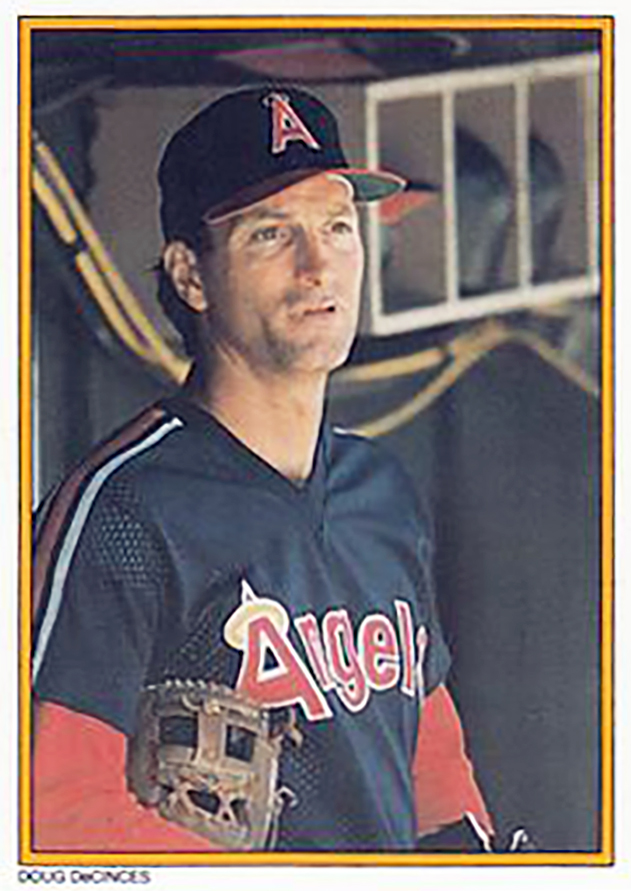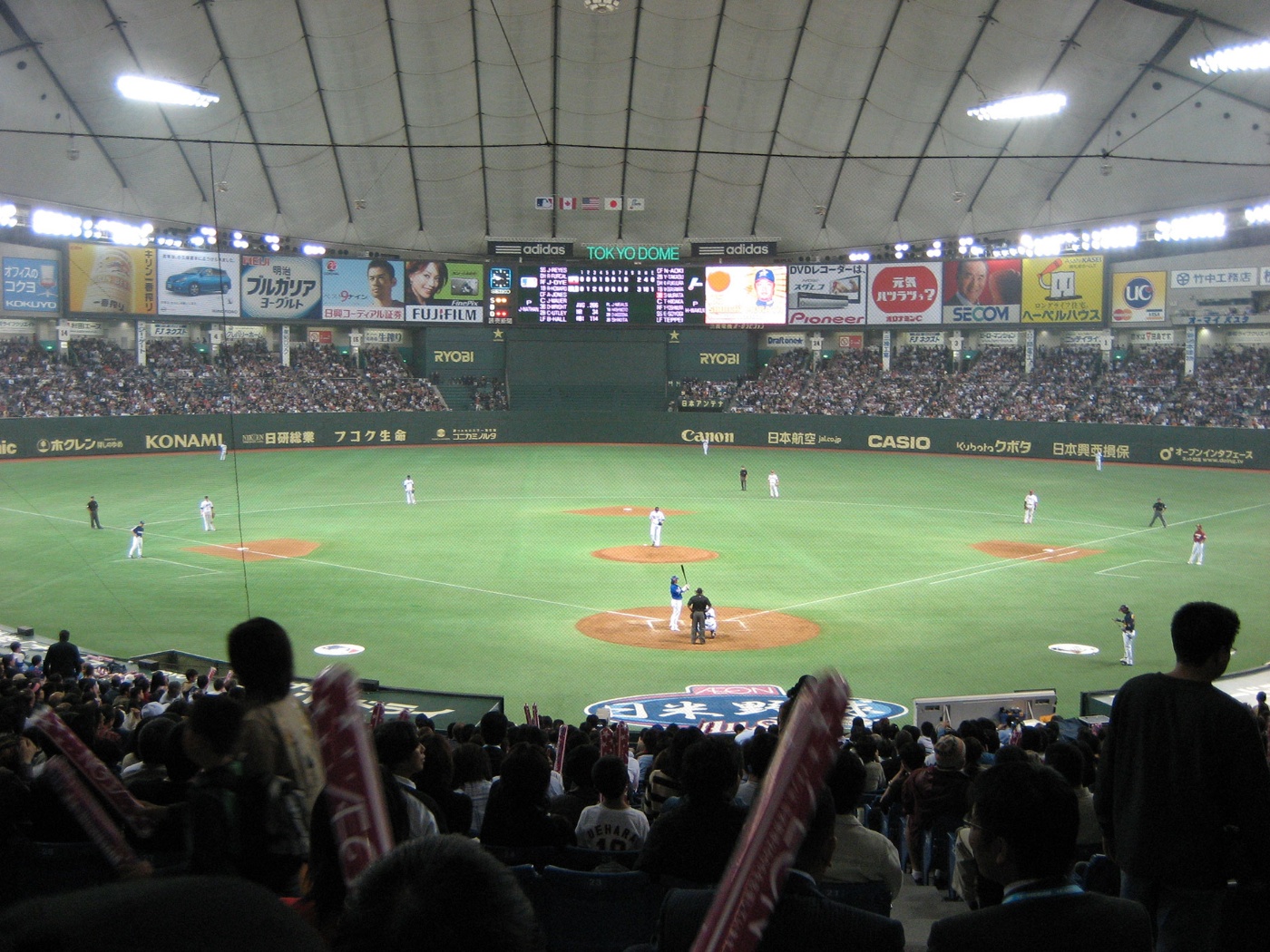‘Gaijin’ Doug DeCinces Christens the Tokyo Dome in 1988
The Tokyo Dome, seen here in 2006, has served as the home stadium of the Yomiuri Giants since it opened in 1988. (Courtesy of Robert Fitts)
Doug DeCinces had a successful career as a major-league third baseman. He started in 1973 with the Baltimore Orioles. By 1976, he replaced future Hall of Famer Brooks Robinson at the hot corner. On June 22, 1979, with the Orioles trailing 5-4, DeCinces hit a walk-off two-run homer that sparked the birth of “Orioles Magic.”1 That home run fueled the momentum that propelled the Orioles to the World Series in 1979. In that Series, he hit a home run in his first at-bat in the fall classic.
 After nine years DeCinces signed with the California Angels in 1982. He played six solid seasons with the Angels, but by 1987 his production began to fade. Near the end of that season, he was released. The St. Louis Cardinals signed him as a free agent to finish the season. In his cup of coffee with the Cardinals, he batted only nine times with two doubles. The team won the pennant but he was ineligible for the postseason. At 37, DeCinces’ professional baseball career seemed to be over.
After nine years DeCinces signed with the California Angels in 1982. He played six solid seasons with the Angels, but by 1987 his production began to fade. Near the end of that season, he was released. The St. Louis Cardinals signed him as a free agent to finish the season. In his cup of coffee with the Cardinals, he batted only nine times with two doubles. The team won the pennant but he was ineligible for the postseason. At 37, DeCinces’ professional baseball career seemed to be over.
Despite offers from the New York Yankees and Oakland Athletics, DeCinces still considered retirement. But in January 1988 the Yakult Swallows offered him a one-year contract at $700,000.2 Feeling he could still be productive, he accepted the deal. “The money certainly had a lot to do with it,” said DeCinces. “Plus, I felt I could still play baseball on a daily basis, as a starter. … I figured if I was going to move my family away from our home for a while, we might as well try something very different. Believe me, it was different!”3
DeCinces and his family faced poor treatment from the people of Japan. “We could sense the hostility every day,” he said. “People would stare at us and laugh at us. After a while, it really gets on your nerves. My final opinion was that the Japanese are just not a great bunch of people.”4 Fans and the media expected much from the Japanese players but derided the American players, called “Gaijin,” a negative connotation for foreigners.
DeCinces launched his Japanese career when the Swallows visited the Tokyo Dome on April 8, 1988. In his first professional plate appearance in a Japanese uniform, he hit a home run against Masumi Kuwata, a rising 20-year-old star for the Yomiuri Giants.5 The hit shocked the Giants. They had scouted DeCinces during spring training and watched him consistently drive the ball to right-center during batting practice. Instead, when Kuwata pitched him inside, he hooked a line drive down the left-field line, barely reaching the stands.6
This was no ordinary home run. It was the first home run in the first official game played in the new Tokyo Dome.7 DeCinces thought this greatest of debuts would endear him to the 56,000 fans including Japan’s Crown Prince Akihito and his wife; they were not impressed.8 The Big Egg, as the Dome was nicknamed, remained silent after the historic blast.9
The next day DeCinces gave the fans an encore performance, hitting another home run, off fellow American Bill Gullickson. Silence again. When a Japanese player went deep in the third game, music, confetti, and cheers followed the player around the bases. The game was stopped for 10 minutes to shower the player with flowers, rice bags, and a case of scotch. His interpreter told DeCinces that the fans were waiting for a Japanese player’s first home run in the Dome.10 To the fans, DeCinces’ two home runs were nonevents.
DeCinces continued to hit well through most of the season. In a late June game, he went 4-for-4 with 4 RBIs. His second home run that day produced a walk-off 4-3 win over the Hiroshima Toyo Carp.11 By August he had hit 13 doubles and 19 home runs, and had driven in 44 runs while posting an OPS of .801 with 141 total bases. But a herniated disc in his back soon caused DeCinces to miss the last two months of the Swallows’ season. Following his doctor’s advice, he decided not to return to baseball in any capacity. Instead, he joined his father’s business in Van Nuys, California, developing commercial and industrial property. “I feel good about my career,” DeCinces said. “I don’t like the way it ended and I don’t like the unprofessional manner in which the Angels handled my final season, but yet I still think of myself as an Angel. I spent more time with the Baltimore Orioles, but I’ll always think of myself as an Angel.”12
By contrast, DeCinces will never think of himself as a Swallow. But with one swing of the bat, he created two historic events, a home run in his first at-bat in Japan and the first blast in Japan’s Tokyo Dome.
Notes
1 John Eisenberg, From 33rd Street to Camden Yards: An Oral History of the Baltimore Orioles (New York: McGraw Hill Publishing, 2001), 335-336.
2 Gene Wojciechowski, “DeCinces Has a Yen to Remain in Baseball,” Los Angeles Times, January 31, 1988. https://www.latimes.com/archives/la-xpm-1988-01-31-sp-39605-story.html. Accessed July 12, 2024.
3 Rich Tosches, “Derailed on the Orient Express: Long, Painful Career of DeCinces Ends Amid Indifference in Japan,” Los Angeles Times, November 20, 1988: 1.
4 Tosches.
5 Kuwata, at age 39, pitched for the Pittsburgh Pirates in 2007. Though he starred for 20 years in Nippon Professional Baseball, he was hit hard in his only US stint, going 0-1 with a 9.43 ERA in 21 innings pitched.
6 Doug DeCinces phone interview with author, April 8, 2024.
7 Wayne Graczyk, “Kroon Can’t Make Cut in San Francisco,” Japan Times, April 10, 2011. https://www.japantimes.co.jp/sports/2011/04/10/baseball/kroon-cant-make-cut-with-san-francisco/. Accessed, July 17, 2024.
8 United Press International, “Doug DeCinces Hit a Solo Homer to Highlight the Opening of the Tokyo Dome,” April 9, 1988. https://www.upi.com/Archives/1988/04/09/Doug-DeCinces-hit-a-solo-homer-to-highlight-the/8158576561600/. Accessed July 16, 2024. Crown Prince Akihito became emperor of Japan in 1989 after the death of his father. His role as crown prince was mostly ceremonial, including appearing at major public events like the debut of the Tokyo Dome.
9 Clyde Haberman, “Amid Some Doubts, a Tokyo Dome,” New York Times, March 23, 1988: A23.
10 DeCinces interview, April 2024.
11 “Former major leaguer Doug DeCinces hit a …,” Los Angeles Times, Los Angeles Times Archives, June 19, 1988. https://www.latimes.com/archives/la-xpm-1988-06-19-sp-7815-story.html. Accessed July 17, 2024.
12 Tosches.


